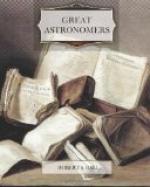It seems, nowadays, strange to find that such thoroughly scientific observations of the new star as those which Tycho made, possessed, even in the eyes of the great astronomer himself, a profound astrological significance. We learn from Dr. Dreyer that, in Tycho’s opinion, “the star was at first like Venus and Jupiter, and its effects will therefore, first, be pleasant; but as it then became like Mars, there will next come a period of wars, seditions, captivity, and death of princes, and destruction of cities, together with dryness and fiery meteors in the air, pestilence, and venomous snakes. Lastly, the star became like Saturn, and thus will finally come a time of want, death, imprisonment, and all kinds of sad things!” Ideas of this kind were, however, universally entertained. It seemed, indeed, obvious to learned men of that period that such an apparition must forebode startling events. One of the chief theories then held was, that just as the Star of Bethlehem announced the first coming of Christ, so the second coming, and the end of the world, was heralded by the new star of 1572.
The researches of Tycho on this object were the occasion of his first appearance as an author. The publication of his book was however, for some time delayed by the urgent remonstrances of his friends, who thought it was beneath the dignity of a nobleman to condescend to write a book. Happily, Tycho determined to brave the opinion of his order; the book appeared, and was the first of a series of great astronomical productions from the same pen.
[Plate: Effigy on Tycho’s tomb at Prague.]
The fame of the noble Dane being now widespread, the King of Denmark entreated him to return to his native country, and to deliver a course of lectures on astronomy in the University of Copenhagen. With some reluctance he consented, and his introductory oration has been preserved. He dwells, in fervent language, upon the beauty and the interest of the celestial phenomena. He points out the imperative necessity of continuous and systematic observation of the heavenly bodies in order to extend our knowledge. He appeals to the practical utility of the science, for what civilised nation could exist without having the means of measuring time? He sets forth how the study of these beautiful objects “exalts the mind from earthly and trivial things to heavenly ones;” and then he winds up by assuring them that “a special use of astronomy is that it enables us to draw conclusions from the movements in the celestial regions as to human fate.”
An interesting event, which occurred in 1572, distracted Tycho’s attention from astronomical matters. He fell in love. The young girl on whom his affections were set appears to have sprung from humble origin. Here again his august family friends sought to dissuade him from a match they thought unsuitable for a nobleman. But Tycho never gave way in anything. It is suggested that he did not seek a wife among the highborn dames of his own rank from the dread that the demands of a fashionable lady would make too great an inroad on the time that he wished to devote to science. At all events, Tycho’s union seems to have been a happy one, and he had a large family of children; none of whom, however, inherited their father’s talents.




